Related Research Articles

Aldous Leonard Huxley was an English writer and philosopher. His bibliography spans nearly 50 books, including novels and non-fiction works, as well as essays, narratives, and poems.

Christopher William Bradshaw Isherwood was an Anglo-American novelist, playwright, screenwriter, autobiographer, and diarist. His best-known works include Goodbye to Berlin (1939), a semi-autobiographical novel which inspired the musical Cabaret (1966); A Single Man (1964), adapted as a film by Tom Ford in 2009; and Christopher and His Kind (1976), a memoir which "carried him into the heart of the Gay Liberation movement".

Swami Prabhavananda was an Indian philosopher, monk of the Ramakrishna Order, and religious teacher. He moved to America in 1923 to take up the role of assistant minister in the San Francisco Vedanta Society. In 1928 he was the minister of a small group in Portland, OR, but in 1930 he founded the Vedanta Society of Southern California. The Swami spent the rest of his life there, writing and collaborating with some of the most distinguished authors and intellectuals of the time, including Aldous Huxley, Christopher Isherwood, and Gerald Heard.
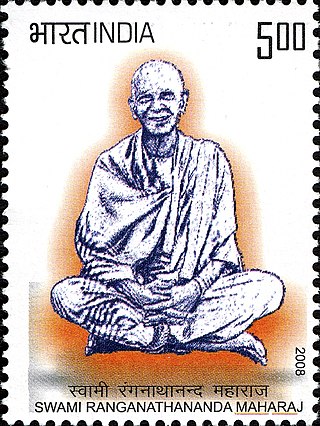
Swami Ranganathananda was a Hindu swami of the Ramakrishna Math order. He served as the 13th president of the Ramakrishna Math and Mission.
Swami Nikhilananda (1895–1973), born Dinesh Chandra Das Gupta was a direct disciple of Sri Sarada Devi. In 1933, he founded the Ramakrishna-Vivekananda Center of New York, a branch of Ramakrishna Mission, and remained its head until his death in 1973. An accomplished writer and thinker, Nikhilananda's greatest contribution was the translation of Sri Sri Ramakrishna Kathamrita from Bengali into English, published under the title The Gospel of Sri Ramakrishna (1942).

The Vivekachudamani is a philosophical treatise within the Advaita Vedanta tradition of Hinduism, traditionally attributed to Adi Shankara of the eighth century, though this attribution has been questioned and mostly rejected by scholarship. It is in the form of a poem in the Shardula Vikridita metre.
Adi Shankara, a Hindu philosopher of the Advaita Vedanta school, composed a number of commentarial works. Due to his later influence, a large body of works which are central to the Advaita Vedanta interpretation of the Prasthanatrayi—the canonical texts consisting of the Upanishads, the Bhagavad Gita and the Brahma Sutras are also attributed to him. While his own works mainly consist of commentaries, the later works summarize various doctrines of the Advaita Vedanta tradition, including doctrines diverging from Adi Shankara.
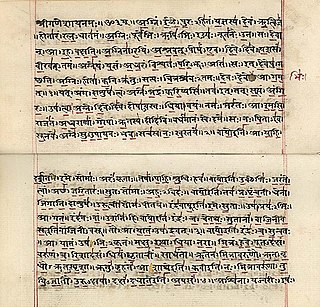
Svādhyāya is a Sanskrit term which means self-study and especially the recitation of the Vedas and other sacred texts. It is also a broader concept with several meanings. In various schools of Hinduism, Svadhyaya is a Niyama connoting introspection and "study of self".

Pranava yoga is meditation on the sacred mantra Om, as outlined in the Upanishads, the Bhagavad Gita, and the Yoga Sutras of Patanjali. It is also called Aum yoga and Aum yoga meditation. It is, simply put, fixing the mind on the sound of the mantra "Aum" – the sacred syllable that both symbolizes and embodies Brahman, the Absolute Reality – as the mantra is constantly repeated in unison with the breath. The purpose of pranava yoga is to become free from suffering and limitation.
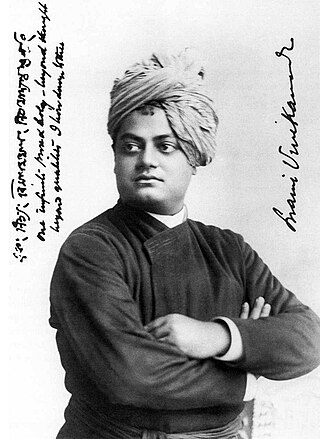
Vedanta Societies refer to organizations, groups, or societies formed for the study, practice, and propagation of Vedanta, the culmination of Vedas. More specifically, they "comprise the American arm of the Indian Ramakrishna movement", and refer to branches of the Ramakrishna Order located outside India.

The Bhagavad Gita, often referred to as the Gita, is a 700-verse Hindu scripture, which is part of the epic Mahabharata. It forms the chapters 23–40 of book 6 of the Mahabharata called the Bhishma Parva. The work is dated to the second half of the first millennium BCE.
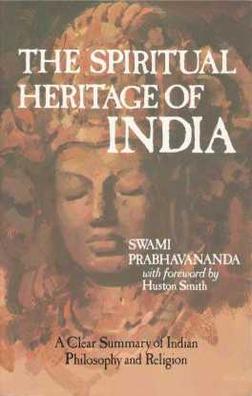
The Spiritual Heritage of India is a book written by Swami Prabhavananda (1893–1976), founder and head of the Vedanta Society of Southern California from 1930 until his death. Originally published in 1962 by Doubleday, the book has been republished with the same title in several later editions, including hardcover, paperback, and sound recording. It has been reviewed in magazines and professional journals. A foreword by Huston Smith was first included in a 1979 edition.

Knowledge and Understanding is a 1955 recording of Aldous Huxley giving a lecture at the Vedanta Society of Southern California's Hollywood temple. The lecture was originally recorded on a wire recorder and digitally transferred to CD. Huxley was a student of Swami Prabhavananda, who founded the Society. Along with Christopher Isherwood and other notable disciples of the Swami, Huxley would occasionally give lectures at the society's temples in Hollywood and Santa Barbara.

Who Are We? is a 1955 recording of Aldous Huxley giving a lecture at the Vedanta Society of Southern California's Hollywood temple. The lecture was originally recorded on a wire recorder and digitally transferred to CD. Huxley was a student of Swami Prabhavananda, who founded the Society. Along with Christopher Isherwood and other notable disciples of the Swami, Huxley would occasionally give lectures at the society's temples in Hollywood and Santa Barbara.
Alongside its importance in the Hindu faith, the Bhagavad Gita has influenced many thinkers, musicians including Sri Aurobindo, Swami Vivekananda, Mahatma Gandhi, Aldous Huxley, Henry David Thoreau, J. Robert Oppenheimer, Ralph Waldo Emerson, Carl Jung, Bulent Ecevit, Hermann Hesse, Heinrich Himmler, George Harrison, Nikola Tesla among others. The main source of the doctrine of Karma Yoga in its present form is Bhagavad Gita.

Built and dedicated in 1956, the Santa Barbara Vedanta Temple is located on a 45-acre (18 ha) property situated between the foothills above the City of Santa Barbara, and below the peaks of the Santa Ynez Mountains. The temple has a clear view overlooking the Pacific Ocean and the Channel Islands of California.
Huxley on Huxley is a 2009 documentary directed by Mary Ann Braubach, narrated by Peter Coyote and includes interviews with Laura Huxley, drummer John Densmore, spiritual leader Ram Dass, Esalen co-founder Michael Murphy, artist Don Bachardy, philosopher Huston Smith and actor Nick Nolte, star of the adaptation of Aldous Huxley's 1955 novel The Genius and the Goddess. The film features archival footage of Aldous Huxley, Timothy Leary, Mike Wallace, and Igor Stravinsky, and photographs from Laura and Aldous Huxley’s personal collection, as well as other historical archives.
Swami Vidyatmananda was born John Yale. He studied under Swami Prabhavananda at the Vedanta Society of Southern California and was ordained as a monk of the Ramakrishna Mission in 1964. He traveled to India and recorded his impressions in the book, A Yankee and the Swamis: A Westerner's View of the Ramakrishna Order. He also edited the journal Vedanta and the West and compiled a selection of the teachings of Swami Vivekananda in What Religion Is: In the Words of Swami Vivekananda which contains an introduction by Christopher Isherwood. He was an assistant to Swami Ritajananda at the Centre védantique Ramakrishna in Gretz, France, where he served as the center's manager until his death on March 22, 2000, at the age of 86. He edited the magazine Vedanta and the West and corresponded with many Western intellectuals including Aldous Huxley, Christopher Isherwood, Walter de la Mare, E. M. Forster, and Gerald Heard. His autobiography The Making of a Devotee reveals his spiritual evolution.
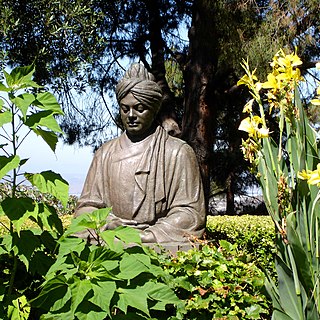
The monastery was originally developed in 1942 during WWII by Gerald Heard, a disciple of Swami Prabhavananda of the Vedanta Society of Southern California an American branch of the Ramakrishna Order of India. Established as Trabuco College, it was originally meant to be a religious, non-sectarian, co-ed monastery, unaffiliated with any particular religious organization. Aldous Huxley, a close friend of Heard, spent 6 weeks there working on his book The Perennial Philosophy.
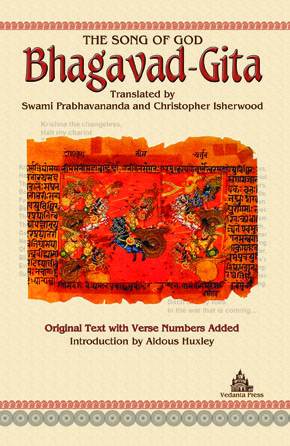
Bhagavad Gita - The Song of God is the title of the Swami Prabhavananda and Christopher Isherwood's translation of the Bhagavad Gītā, an important Hindu scripture. It was first published in 1944 with an Introduction by Aldous Huxley. This translation is unusual in that it is a collaboration between a world-renowned English language author and an adept in Vedanta Philosophy and Hindu scripture. With this translation, "...the very purpose of life in Hindu terms becomes luminously clear.”. The 2023 edition includes the standardized verse markings that were left out from the original, published in 1944.
References
- ↑ Jackson, Carl (1994). Vedanta for the West. Indiana University Press. p. 124. ISBN 0-253-33098-X.
- ↑ SRINIVAS, SMRITI. “Utopian Settlements and Californian Vedanta.” A Place for Utopia: Urban Designs from South Asia, University of Washington Press, 2015, pp. 87–120. "Many of these were collaborations with scholars and intellectuals such as Frederick Manchester and Christopher Isherwood; and many were later published as books through the Vedanta Press (established in 1947)" JSTOR, http://www.jstor.org/stable/j.ctvcwnx0v.7. Accessed 24 July 2023.
- 1 2 Editorial (1947). "Reviews". Publishers Weekly. 147: 1573.
- ↑ Introduction to the Bhagavad Gita – The Song of God by Aldous Huxley, page 15 2023 Edition, Vedanta Press
- ↑ Rice, Laban Lacy. “Reply to Mr. Viereck.” The American Scholar 21, no. 2 (1952): 246–48." "Vedanta and the West A Periodical of Exploration and Expression of the Perennial Philosophy Editor: Swami Prabhavananda Managing Editor: John R. Yale Editorial Advisers: Gerald Heard, Aldous Huxley, Christopher Isherwood... http://www.jstor.org/stable/41206900
- ↑ Jackson, Carl (1994). Vedanta for the West. Indiana University Press. p. 124. ISBN 0-253-33098-X.
- ↑ Bridges, Hal. Aldous Huxley: Exponent of Mysticism in America. Journal of the American Academy of Religion, vol. 37, no. 4, 1969, pp. 341–52. JSTOR, "After [Huxley's] meeting with Prabhavananda, he undertook an intensive study of the lives and teachings of outstanding mystics in the major religions. The ideas thus derived from study and practice flowed into writings dominated by mystical concern -- into essays for the magazine Vedanta and the West" http://www.jstor.org/stable/1460759. Accessed 29 July 2023.
- ↑ Index of the publication history of Vedanta and the West.